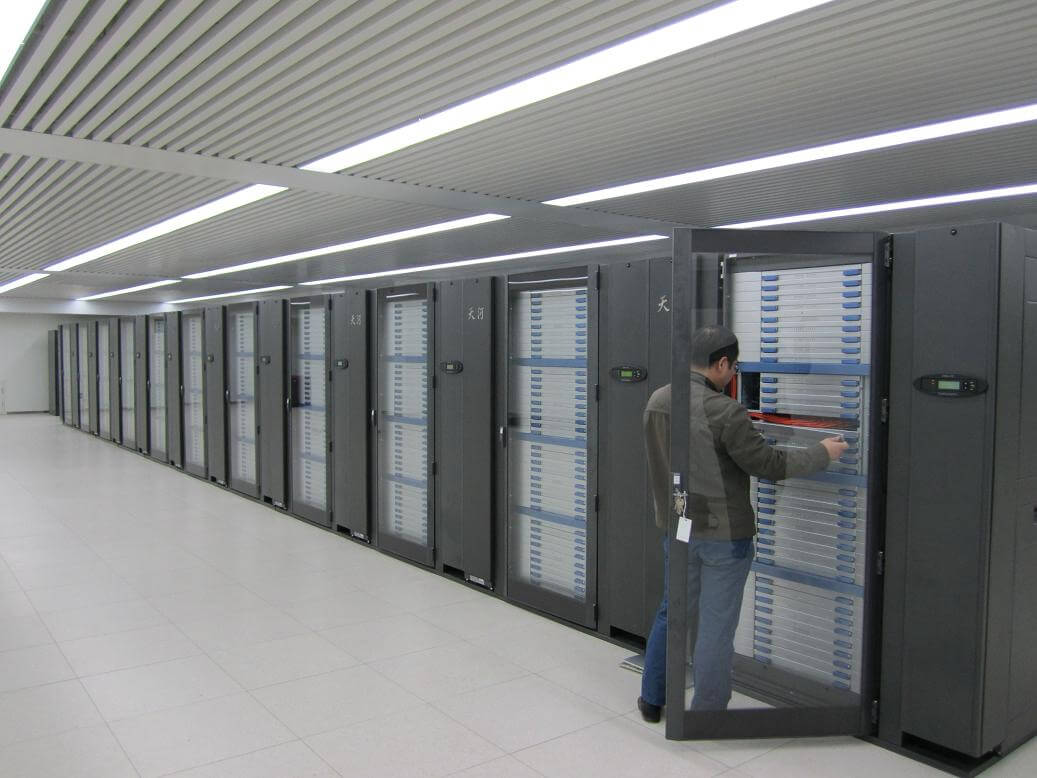A scientific-security research center in China built the supercomputer that overshadows the computer that led the list of 500 most powerful computers by 1.4 times

The computer, known as Tianhe-1A located at the National University of Defense Technology in Tianjin, is 1.4 times more powerful than the computer that topped the list until now, located at the National Laboratories in Tennessee, as measured by standard tests used to assess how well computer systems can handle mathematical calculations. This is according to an official ranking published by a researcher at the University of Tennessee.
This week the list of the 500 most powerful computers in the world is going to be announced, but it doesn't seem like another system will surpass the Chinese computer.
The center operates, according to the Chinese, under dual management - of the Ministry of National Security and the Ministry of Education.
The race to build the most powerful supercomputer has become a source of national pride, due to the ability of the machines to solve problems vital to the national interest in areas such as security, energy, finance and science. Supercomputing technology also reaches ordinary businesses such as oil and gas exploration and Wall Street trading. Even companies like Procter & Gamble use supercomputers to ensure the chips fit into the cans without breaking.
In the Chinese system, thousands upon thousands of chips developed and built by American companies led by Intel and NVIDIA are connected. But the secret of these devices is in the interconnection, or the network technology and this was developed by Chinese researchers. It is estimated that the cost of the computer was several billion dollars.

15 תגובות
Maybe capitalists sounds sexy to you,
But I do not rule out getting closer to Russia in state relations.
We have a lot of their mentality in the past,
And we also have many modern Russian speakers.
As for China, it's more difficult, we have a lot of their workers,
But I have not seen any attempt at a rapprochement between our people and their people.
(For me, intimacy is of course marriage)
What a shame, what a shame.
As long as capitalist America owes trillions to communist China - now the reds are also surpassing us in technology.
Adam Smith and Milton Friedman are turning over in their graves.
To simulate a human brain needs much more than 1000 Peta Flop which is exactly 1 Exa Flop. The brain has 10 to the power of 11 neurons that are connected to each other in a tangle that creates a monstrous neuron network at an indescribable level - what's more, this evaluation is completely dynamic and completely distributed - many processes read simultaneously in several places in the brain, and even a single neuron is more than just an electrical conductor with impedance - it has abilities His own example that they still don't really understand. In short, the singularity will have to wait...
That's exactly what I did…
Differentiate between calculation power and wisdom, these are two completely different things, what's more that "smart" is not something that can be quantified... smart in mathematics? Even a 30-year-old computer takes you through any simple mathematical calculation in terms of time, so what kind of intelligence are you talking about?
In any case, it is estimated that to simulate an entire human brain at the level of a neuron (a simplified model of a neuron) would require a processing power of 1000 petaflops.
It should also be noted that 1000 petaflops is the total processing power available in all computers on earth. That is, one stupid person is smarter than all the computers in the world combined.
What is the excitement?
Well, well, you probably don't know my wife...
The new arms race!
Who has a bigger…
My father I searched and what I found is this:
The world's fastest computer, the "K" supercomputer by Fujitsu and RIKEN, will keep its title by breaking its own speed record.
Computer K improved its speed from 8 to 10.5 petaflops
The rate of progress of the Chinese in all fields, from the impressive achievements in space to supercomputers, is amazing.
Progress in the economy, industry, trade, military, influence...
Is it time to learn Chinese???
Search Google news and you will see that all the relevant sites published the news in the last few days.
Avi, it's really a bit strange, this article is correct for 2010, since then there is already a more powerful computer, the k-computer that reaches 8 petaflops.
Temporary degree soon a stronger supercomputer and then even stronger
Why are we not there?
?
This somewhat contradicts something else I read recently regarding a Japanese or Korean computer that does 10 peta-flops...
In any case, Ibiam is already working on a computer several orders of magnitude faster than this Korean/Japanese computer.
Is the singularity approaching? 🙂
It should be noted that the supercomputer in question reaches a computing power of 2.5 peta-flops. (Peta = thousand tera = million Giga).
For comparison, a 4-core processor from the new generation of Intel reaches 50 giga-flops. (Supercomputers in the years 93-95 reached these rates).